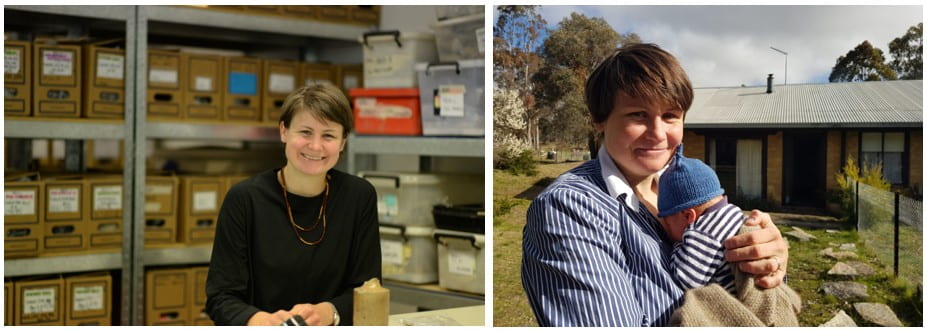Images: Caiti D’Gluyas in research mode; with new baby, Felix.
Submitting a PhD can be a little like giving birth. Just ask archaeology student Caiti D’Gluyas, who recently had the surreal experience of doing both on the same day.
For Caiti, it was the lead-up to both big due dates where most of the action happened.
“When it was over, it was strangely anticlimactic!” she says. I had spent years thinking about finishing my PhD and nine months for the birth, and then I really felt like the actual finishing of both were so uneventful.
As soon as I knew that both the PhD and baby were due at the same time, I really stepped up my planning and was motivated to reach my goals on time.
“I guess I felt a sense of relief that they were both done and I certainly had a chuckle that Felix decided to arrive on that day – I’d previously decided that it would be the day I submitted!”
The impending birth did, however, shape the way she approached her studies – and even the way she felt about the subject matter.
“As soon as I knew that both the PhD and baby were due at the same time, I really stepped up my planning and was motivated to reach my goals on time. I ended up getting most of my work done well before the due date,” Caiti says.
“The week before both were due I got COVID, which definitely slowed me down. I was glad I’d already been motivated to finish things early so I could rest.”
Her research involved studying juvenile convict history – those sentenced and transported to Australia between the ages of 10 and 18. She researched one of the first juvenile prisons on the British Empire for a larger UNE project, Landscapes of Production and Punishment, looking at the origins of today’s juvenile criminal justice system and perceptions of youth in the early 19th century.
“Thinking about families in the past who, for example, had a 10-year-old who was transported to Australia as a convict to never be seen again, is unfathomable now as a parent, and those feelings were more intense during pregnancy.
“It can be fascinating how your own personal experience can alter how you think about your studies.”
Even before the arrival of Felix, she says learning flexibly has had its perks and challenges.
“It certainly has been a challenge to work to my own schedule, especially at home during lockdown. I really feel like a large portion of my tertiary education has been learning how to learn.”
Thinking about families in the past who, for example, had a 10-year-old who was transported to Australia as a convict to never be seen again, is unfathomable now as a parent, and those feelings were more intense during pregnancy.
She says its important to find what motivates you.
“I work well with a structured day – I’d usually do 25-minute blocks of work followed by a five-minute break. I set clear goals for myself – so, lots of lists, and some good dangling carrots help – I love puzzles, so I put one behind my computer as something fun to do when I finished.
“And on the days where I felt I just wasn’t being productive, or my family needed me, I would just accept that and not work. A flexible study schedule was valuable for those times.”
Caiti has some other great tips for balancing study, family and life.
“I think it’s important not to give up on other important activities that help you stay happy. For example, I played AFL with the UNE/Armidale team throughout my UNE studies – until I was pregnant – and have lots of other hobbies that I’ve fitted in at home.
“At times I regretted the time commitment but overall, I think it’s helpful to keep doing the things you love. Everyone is different, but I feel the more I fit in, the more motivated I am to do more.”
But that doesn’t mean you have to go it alone.
“Get all the support you can!” Caiti says. “I could not have done this without my partner assisting with childcare – he has been primary carer for my toddler for the last year, as well as financial and emotional support. We are a great team, and I really feel like that has been my secret superpower during my studies!
“I’ve also happily joined a cohort of archaeologists at UNE – both HDR students and staff – that are an inspiring and engaging bunch!”
With this support and her sharpened time management skills, Caiti pursuing her interest in archaeology next year is looking possible.
“I’m aiming for some shorter contracts in both research and consulting archaeology. I have maintained some archaeology consulting work throughout my PhD so I still have industry connections that I will be returning to and aiming to publish more of my PhD research, along with juggling childcare.”



Recent Comments